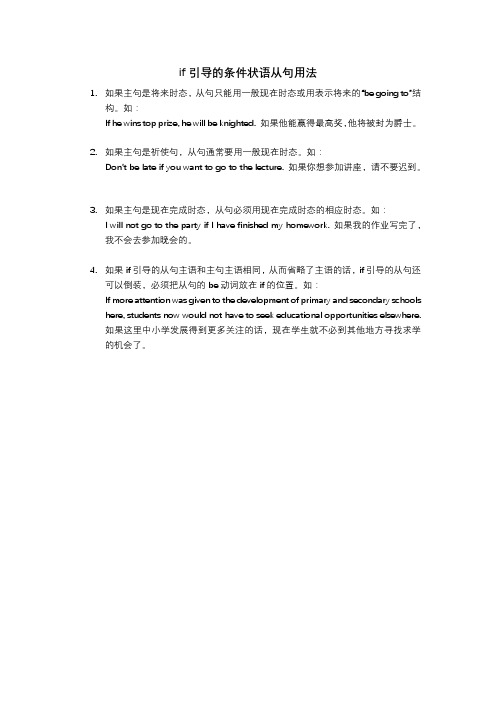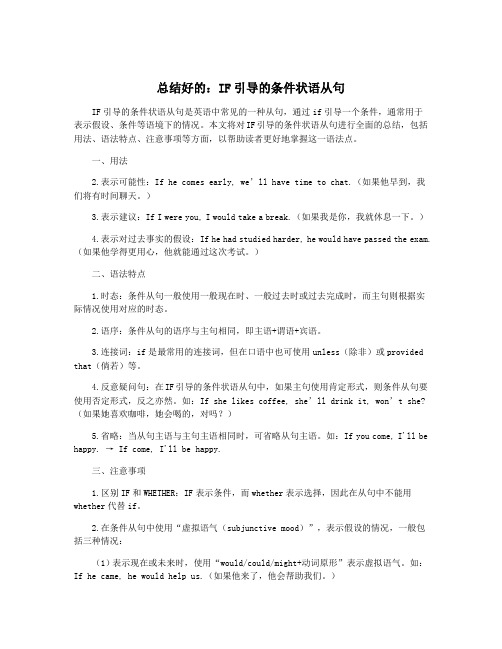if条件状语从句的用法_If引导的条件状语从句
知识点名:if引导的条件状语从句

知识点名:if引导的条件状语从句讲义:if引导的条件状语从句1. if意为“如果”,引导条件状语从句时,既可放在主句前面,也可放在主句后面。
若if条件句放在句首,从句后面常加逗号与主句隔开。
If you go there, I'll go, too.如果你去那儿,我也会去。
My mother will take me to the park if she is free.如果我妈妈有空,她就会带我去公园。
2. 时态运用:在含有if引导的条件状语从句的主从复合句中,主句为下列情形之一的,条件状语从句通常用一般现在时。
(1) 主句是一般将来时,即遵循“主将从现”的原则。
If he comes, he will bring his violin.如果他来,他就会把他的小提琴带来。
(2) 主句是含有情态动词may/might/can/must/should等的句子。
If you want to lose weight, you must eat less bread.如果你想减肥,你必须少吃面包。
(3) 主句是祈使句。
If you are not strong enough, please don't take part in such an activity.如果你不是很健壮,请不要参加这种活动。
3. 句型转换:(1) 借助“祈使句+and/or+陈述句(一般将来时)”这一句型来转换。
其中,在句意上and表示顺承;or表示转折,意为“否则”。
If you work hard, you'll pass the exam easily.=Work hard, and you'll pass the exam easily.努力学习,你将很容易通过考试。
Work hard, or you won't pass the exam easily.努力学习,否则你不会轻易地通过考试。
if状语从句的用法

if状语从句的用法1. if 引导的条件状语从句(真实条件句)用在if引导的条件状语从句中,表示在某种条件下很可能发生时,就是真实条件句,通常从句用一般现在时,主句用将来时态或者情态动词+动词原形或者祈使句的形式。
1 if从句用一般现在时,主句用一般将来时例If he runs he’ll get there in time. 如果他跑的话,他就会及时赶到那儿。
The cat will scratch you if you pull its tail. 如果你拉这只猫的尾巴,它就会抓你。
2 if从句用一般现在时,主句用may/might/can+动词原形例If the fog gets thicker the plane may/might be diverted. 如果雾再大一些,飞机可能就会改在别的机场降落。
If it stops snowing we can go out. 如果雪停了,我们就可以出去。
3 if从句用一般现在时,主句用must/should+动词原形例If you want to lose weight you must/should eat less bread. 如果你想减肥,就必须/应该少吃面包。
4 if从句用一般现在时,主句用一般现在时例If you heat ice it turns to water.(也可用will turn)如果你给冰加热,它就会化成水。
5 if从句用现在进行时,主句用一般将来时例If you are looking for Peter you’ll find him upstairs. 如果你是在找彼得,上楼就会找到他。
6 if从句用现在完成时,主句用一般将来时例If you have finished dinner I’ll ask the waiter for the bill. 如果你吃完了,我就叫服务生来结账。
2. If引导的条件状语从句(虚拟条件句)用表示的内容与现在事实相反,if从句用一般过去时,主句用“would/should/could/might+动词原形”;表示与过去事实相反,if从句用had+动词的过去分词,主句用would/should/could/might+have+动词的过去分词;表示对将来情况的主观推测,if从句用①should+动词原形②were to+动词原形,主句用would/should/could/might+动词原形。
if作为如果的用法

if作为如果的用法"If" 是英语中的一个条件连词,表示“如果”、“假设”或“倘若”等意思。
它主要用于引导条件状语从句,表示某个条件成立时,主句的动作或状态就会发生。
以下是"if" 的一些基本用法:1. 基本形式:if + 条件状语从句,主句。
例如:- If it rains tomorrow, I will take an umbrella.(如果明天下雨,我会带伞。
)- If I have time, I will go to the movie with you.(如果我有时间,我会和你一起去看电影。
)2. 否定形式:if + 条件状语从句,主句+ not。
例如:- If he doesn't study hard, he won't pass the exam.(如果他不努力学习,他就不能通过考试。
)3. 疑问形式:if + 条件状语从句,主句+ 吗?例如:- If she likes dancing, does she go to the dance class?(如果她喜欢跳舞,她去上舞蹈课吗?)4. 短语搭配:- if only:表示对过去事物的愿望或遗憾,意为“要是……就好了”。
例如:- If only I had known about the party earlier.(要是早点知道这个派对就好了。
)- unless:表示除非某个条件成立,否则会发生某个结果。
例如:- Unless you hurry up, you'll be late for the train.(除非你快点,否则你会错过火车。
)- in case:表示以防万一,用于引导目的状语从句。
例如:- Bring an umbrella in case it rains.(以防下雨,带上伞。
)- on condition that:表示在某个条件成立的情况下,才会发生某个动作或状态。
If引导条件状语从句的详细用法解答

If引导条件状语从句的详细用法解答引导条件状语从句最常用的连词是if,常见的if条件状语从句表示在某条件下,某事很可能发生,条件是可能存在的,主句中某种情况发生的概率也是很高的。
如:If you ask him,he will help you.如果你请他帮忙,他会帮你的。
If you fail in the exam,you will let him down.如果你考试不及格,你会让他失望的。
If you have finished the homework,you can go home.如果你作业做完了就可以回家了。
if 条件句的时态搭配1.if从句用一般现在时,主句用一般将来时If he runs he’ll get there in time. 如果他用跑的,他就会及时赶到那儿。
The cat will scratch you if you pull her tail. 如果你拉猫的尾巴,它就会抓你。
2.if从句用一般现在时,主句用may/might/canIf the fog gets thicker the plane may/might be diverted. 如果雾在大一些,飞机可能就会改在别的机场降落。
If it stops snowing we can go out. 如果雪停了,我们就可以出去。
3.if从句用一般现在时,主句用must/shouldIf you want to lose weight you must/should eat less bread. 如果你想减肥,你必须少吃面包。
4.if从句用一般现在时,主句用一般现在时If you heat ice it turns to water. (也可用will turn)如果把冰加热,它就会化成水。
5.if从句用现在进行时,主句用一般将来时If you are looking for Peter you’ll find him upstairs. 如果你是在找彼得,上楼就会找到他。
if引导的条件状语从句用法

if引导的条件状语从句用法
1.如果主句是将来时态,从句只能用一般现在时态或用表示将来的“be going to”结
构。
如:
If he wins top prize, he will be knighted. 如果他能赢得最高奖,他将被封为爵士。
2.如果主句是祈使句,从句通常要用一般现在时态。
如:
Don’t be late if you want to go to the lecture. 如果你想参加讲座,请不要迟到。
3.如果主句是现在完成时态,从句必须用现在完成时态的相应时态。
如:
I will not go to the party if I have finished my homework. 如果我的作业写完了,
我不会去参加晚会的。
4.如果if引导的从句主语和主句主语相同,从而省略了主语的话,if引导的从句还
可以倒装,必须把从句的be动词放在if的位置。
如:
If more attention was given to the development of primary and secondary schools here, students now would not have to seek educational opportunities elsewhere.
如果这里中小学发展得到更多关注的话,现在学生就不必到其他地方寻找求学的机会了。
小学英语if 引导的条件状语从句讲解

if引导的条件状语从句(包含主将从现原则)一.if的位置:if“如果”,当引导条件状语从句时,既可以放在主句前面,也可以放在主句后面。
若if引导的条件句放在句首,从句后面要加逗号与主句隔开。
例如:My mother will take me to the park if she is free.如果我妈妈有空,她就会带我去公园。
If my mother is free, she will take me to the park.如果我妈妈有空,她将会带我去公园。
(此句if引导的条件状语从句位于句首,主句位于其后,所以要用逗号隔开)二.时态的运用注意:在if的条件状语从句中,主句为下列情形之一时,if条件状语要用一般现在时。
1.主句是一般将来时(主将从现)例如:If he comes, he will tell me all.如果他来了,他会告诉我所有(的事情)。
(这个知识点在初中阶段是常考题,简称“主将从现”——主句是一般将来时态,从句是一般现在时态。
本句中主句是由will引导的一般将来时态的句子,从句是由if引导的一般现在时态的句子,符合主将从现的法则。
)2.主句是含有情态动词may/might/can/must/should等句子。
例如:If you want to lose weight, you must eat less bread.如果你想减肥,你必须少吃面包。
(主句中含有情态动词must,所以if引导的条件状语从句要用一般现在时态。
)3.主句是祈使句例如:If you are not strong enough, please don't take part in such an activity.如果你不够强壮,请不要参加这种活动。
(主句是一个Do型的祈使句,所以根据原则,if从句要用一般现在时态。
——不清楚Do型祈使句的小伙伴可以查看冉老师历史发文记录)三.习题1.If you to be a rich man ,you should try hard.A. wantingB. wantedC. wantD.are want2. If you English, you can be an English teacher.A. likingB. likedC. likeD. are like3. If you like sports , you a PE teacher.A. areB. mustC. can beD. could。
总结好的:IF引导的条件状语从句

总结好的:IF引导的条件状语从句IF引导的条件状语从句是英语中常见的一种从句,通过if引导一个条件,通常用于表示假设、条件等语境下的情况。
本文将对IF引导的条件状语从句进行全面的总结,包括用法、语法特点、注意事项等方面,以帮助读者更好地掌握这一语法点。
一、用法2.表示可能性:If he comes early, we’ll have time to chat.(如果他早到,我们将有时间聊天。
)3.表示建议:If I were you, I would take a break.(如果我是你,我就休息一下。
)4.表示对过去事实的假设:If he had studied harder, he would have passed the exam.(如果他学得更用心,他就能通过这次考试。
)二、语法特点1.时态:条件从句一般使用一般现在时、一般过去时或过去完成时,而主句则根据实际情况使用对应的时态。
2.语序:条件从句的语序与主句相同,即主语+谓语+宾语。
3.连接词:if是最常用的连接词,但在口语中也可使用unless(除非)或provided that(倘若)等。
4.反意疑问句:在IF引导的条件状语从句中,如果主句使用肯定形式,则条件从句要使用否定形式,反之亦然。
如:If she likes coffee, she’ll drink it, won’t she?(如果她喜欢咖啡,她会喝的,对吗?)5.省略:当从句主语与主句主语相同时,可省略从句主语。
如:If you come, I'll be happy. → If come, I'll be happy.三、注意事项1.区别IF和WHETHER:IF表示条件,而whether表示选择,因此在从句中不能用whether代替if。
2.在条件从句中使用“虚拟语气(subjunctive mood)”,表示假设的情况,一般包括三种情况:(1)表示现在或未来时,使用“would/could/might+动词原形”表示虚拟语气。
总结好的:if引导的条件状语从句

总结好的:if引导的条件状语从句if引导的条件状语从句if1) ⽤法:(1)条件状语从句通常由连词if引导,意为“如果、假如”,主句不能⽤be going to表⽰将来,⽽应该⽤shall,will。
If you leave now, you are never going to regret it. (错误)If you leave now, you will never regret it. (正确)(2)if “如果”,引导条件状语从句,主句⽤⼀般将来时,从句则⽤⼀般现在时,如:If it rains tomorrow, I shan’t climb the hills.(3)另外,主句是祈使句或含有情态动词,从句也⽤⼀般现在时。
如:Please call me if he comes next Sunday.Can you call the policeman if you are in the trouble.注意宾语从句中的if与条件状语从句if的区别。
宾语从句中的if“是否”相当于whether,引导宾语从句,时态需根据语境确定。
如果主句⽤⼀般现在时,从句可以根据具体情况选⽤时态,如果主句⽤⼀般过去时,从句必须⽤过去式的某种形式。
I don't know if it will rain tomorrow. 我不知道明天是否会下⾬。
Our teacher said there was going to be a football match the next month.我们说下⽉将有场⾜球⽐赛。
【边学边做】⽤括号内所给词的正确形式填空。
1. What will you buy if you ________(have)a lot of money?2. If it ________(not snow)tomorrow, we will feel unhappy.3. You mustn’t go to school if you ________(be)still in bed.4. If he _______(be)at home at that time, he would know it.5. Please show me the way if you ________(know)it.6. You will hurt your teeth if you ________(eat)too much candy.7. If you gave me a toy car, I _________(be)very happy.8. I would get the prize if I _________(work)hard.9.If she ______ (finish ) work early ,she ______(go) home.10.If the weather______(be)fine,we_______(go)for a walk .11. If I_____(have) time tonight ,I _______(finish) the book I’m reading.12. If it ______(rain) next weekend , we_______(not be able to ) plant the vegetable .13. If it_______(rain),we______(stay) at home .14.If she______(arrive) ,she _____(phone) me .15. If he_____(call),tell him I’ll ring back .⼆、⽤所给词的适当形式填空1. If you ________(feel) tired, you _________ (have) to have a rest.2. Where _____ he ____(see) the film if he _________(have) time?3. If there ____ (be) fewer trees, there _______ (be) more pollution.4. He ___ (dress) more casually if he ___ (not work) on weekends.5. If Marcia _______ (live) alone, she _______ (keep) a pet parrot.6. Lana _____ (buy) a new dress if the old one ____ (be) out of style.7. The twins _______ (fight) if they__________ (argue).8. I ______ (have) a bake sale if I ____ (need) money for education.9. Peter ____ (send) me a beautiful souvenir if he ____(tour) Spain.10. If Mr. Green _______ (say) I am hard- working, my parents ___ (feel) glad.11. I ______ (go) to the beach if it________ (not rain) this week.12. _____they ___ (have) a match if the P.E. teacher __ (be) busy?13. He ____ (write) a letter to his grandparents if he ____ (get) his report card this week.14. If she ______ (get) up late, she _____ (not catch) the early bus.15. Peter ____ (major) in English if he ____(pass) the exams in Peking University.⼆、完成句⼦1. 他如果看电视太久了,他的⽗母会不⾼兴。
- 1、下载文档前请自行甄别文档内容的完整性,平台不提供额外的编辑、内容补充、找答案等附加服务。
- 2、"仅部分预览"的文档,不可在线预览部分如存在完整性等问题,可反馈申请退款(可完整预览的文档不适用该条件!)。
- 3、如文档侵犯您的权益,请联系客服反馈,我们会尽快为您处理(人工客服工作时间:9:00-18:30)。
if条件状语从句的用法_If引导的条件状语从句很多英语学习者都觉得If引导的条件状语从句这个句型很难,学习起来很吃力。
下面是小编为你整理的If引导的条件状语从句的相关资料,希望大家喜欢!If引导的条件状语从句用法1.if引导的条件状语从句可以放在主句之前,也可以放在主句之后,如果放在主句之前,中间要用逗号将主句和从句隔开。
例如:If I am free, I will come to see you.= I will come to see you if I am free.如果我有空,我就来看你。
2. 在含if引导的条件状语从句的复合句中,主句用一般将来时,从句通常用一般现在时态表示将来意义,即主将从现原则。
例如:If it snows tomorrow, we will go skiing.如果明天下雪,我们就去滑雪。
3. 在含if引导的条件状语从句的复合句中,语句的谓语还可含有情态动词can、must、may等,主句也可是祈使句。
例如:If it stops raining, we can go out.如果雨停了,我们就能出去。
4. 在含if引导的条件状语从句的复合句中,如果主句部分描述的是客观事实或真理,要用一般现在时。
例如:If you heat the ice, it turns into water.如果你加热冰,它就会变成水。
if引导的非真实条件句对过去的虚拟条件从句(if):主语+had done 主句might/would/should/could+have done 对现在的虚拟if+ 主语+动词过去式(be用were)主句might/would/should/could+do对将来的虚拟if+主语+动词过去式(be用were)或主语+should do或主语+were to do主句might/would/should/could+doe.g.Tom got to the station in time because he started earlier.If Tom had started late, he would have missed the train.Do you think the thief entered through the door?No, if he had, I don't believe, he would have broken the living room window.If the book weren't so expensive, I would buy it.If you didn't live so far away, we would be able to visit you more.What would you do if you lost your passport in a foreign country?Why hasn't he come? If he should not come on time, we would have to put off the trip.2.注意事项e.g.If she hadn't work hard at English in the past, she wouldn't work as well as a secretary in a large company now. 混合时间的虚拟语气从句为对过去的虚拟,主句是现在。
Had we not used an out-of-date timetable, we wouldn't have missed the train.if引导从句的倒装从句相当于if we had not used an out-of-date timetable, 同样,were还有should 在从句中都可以提前,省略if.If only 要是...就好了If only I were younger!If only I had worked harder in my teenage years!If only I should travel tomorrow!虚拟语气的十大句型一、虚拟条件句:条件状语从句是非真实情况,在这种情况下要用虚拟语气。
1.条件从句与现在事实不一致,其句型为:句型1:If +主语+过去时,主语+ should (could, would, 或might) +动词原形(1) If I were you, I would study hard.(2) If it rained, I would not be here now.2.条件从句与过去事实不一致,其句型为:句型2:If +主语+had+过去分词,主语+ should(could, would, 或might)+ have +过去分词(3) If the doctor had come last night, the boy would have been saved.(4) If I had not studied hard, I would have failed in the exam last term.3.条件从句与将来事实不一致,其句型为:句型3:If +主语+过去时/ should +动词原形/ were to+动词原形,主语+ should (could, would, 或might) +动词原形(5) If it should rain tomorrow, we would stay at home.(6) If I were to go to the moon one day, I could see it with my own eyes.(7) If you missed the film tonight, you would feel sorry.注意问题:1.If条件句中绝对不可以出现would。
2.根据句中的时间状语,有时可能出现混合虚拟的情况,即主句可能是现在的情况,条件句也许是发生在过去的情况,但都要遵守上述句型。
如:(8) If you had studied hard before, you would be a college student now and you would graduate from a college in four years’ time.3.条件句中如果出现were, had, should可省去if,将主语与这些词倒装。
例如:(9) Had the doctor come last night, the boy would have been saved.(10) Were I to go to the moon one day, I would see it with my own eyes.(11) Should it rain tomorrow, we would stay at home.二、名词性虚拟语气:在表示命令、建议、要求、惊叹时的名词性从句中需用虚拟语气,基本句型:句型4:主语+(should)+动词原形(12) Mother insisted that John (should) go to bed at 9 o’clock.(宾语从句)(13) It was required that the crops (should) be harvested at once.(主语从句)(14) It is surprising that she shouldn’t pass the math exam. (主语从句)(15) The suggestion that he (should) be invited was rejected.(同位语从句)(16) Their demand is that their wages (should) be increased.(表语从句) 注意:在这种句子中绝不可以出现would, must, could等。
三、虚拟语气在一些特殊词中的使用或含蓄条件句:句型5:wish后的宾语从句与现在愿望不一致:主语+过去时;与过去愿望不一致:主语+ had +过去分词/ could + have +过去分词;与未来愿望不一致:主语+ would / could +动词原形。
如;(17) I wish I were you.(18) I wish I had visited the White House when I was in the States.(19) I wish I could meet you tomorrow at the party.句型6:It’s time句型(当It’s time后用that从句时应该为主语+ should +动词原形或主语+过去时)(20) It’s time that you went / should go to school.句型7:If only引起的感叹句相当于How I wish +宾语从句(21) If only he could come! 他要能来就好了。
(22) If only I had known the answer! 我要早知答案就好了。
句型8:would rather, as if(though)引导的句子也需使用虚拟,表示过去的情况用过去完成时,表示现在与将来的情况用过去时。
(23) I’d rather you posted the letter right away.(24) I’d rather you had returned the book yesterday.(25) She loves the children as if they were hers.(26) Alan talked about Rome as if he had been there.句型9:without, but, but for, but that, otherwise引起的短语或句子常暗含着虚拟条件。
(27) Without you, I would never know him.(28) But for your cooperation, we wouldn’t have done the work so well.(29) But that she was afraid, she would have said no.(30) I would be most glad to help you, but I’ am busy now.(31) I should have come to the party yesterday, but I was busy.(32) I am busy now; otherwise I would do you the favor!句型10:If it were not for ... / If it hadn’t been for ... (要不是因为),其后面的主句也需使用虚拟。
